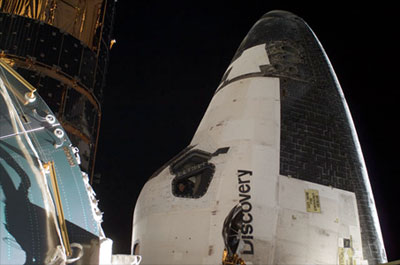Space shuttle Discovery's crew will be getting in some extra work inside the new Permanent Multipurpose Module (PMM)
Leonardo Friday in the first of two days that have been added to the STS-133 mission.
Their day started at 3:23 a.m. CST to the chords of "The Ritual/ Ancient Battle/ 2nd Kroykah," — better known as the Star Trek fight song — from the soundtrack of the original Star Trek television series.
"Hope you enjoyed that music," said capcom Mike Massimino in Mission Control. "That music comes to you from your training team. They're very proud of the job you are doing and making them look good."
"Thanks to our training team. We've had just a super training team that a great job with us and we really enjoyed training and had a lot of fun with them all the way through the flow. So, thanks to them," replied STS-133 mission commander Steve Lindsey.
The additional days were added to the mission to allow Discovery's crew more time to help the International Space Station crew members get the PMM
Leonardo unpacked and set up for permanent life in orbit and to help with equipment repair.
Commander Steve Lindsey, pilot Eric Boe, mission specialists Michael Barratt, Alvin Drew, Steve Bowen and Nicole Stott, together with station flight engineers Cady Coleman and Paolo Nespoli will spend much of their day working on various PMM-related tasks. They will be installing fixtures inside the module, unpacking items sent up inside and removing the Express Rack 8 for installation in the
Destiny laboratory.
They will also take some time to talk with students and reporters on the ground.
At just after 6:00 a.m., the NASA Educational Technology services team and student interns working at Marshall Space Flight Center in Huntsville, Ala. posed questions to the crew selected by students through the NASA education
Taking Up Space blog.
At 9:48 a.m., all 12 members of the combined shuttle and station crews will gather to answer questions from reporters during the Joint Crew News Conference.
Earlier this morning, the station crew investigated the cause of a smoke alarm in the Russian Pirs docking compartment. Commander Scott Kelly used a compound specific combustion product analyzer (CSCPA) to take samples of the air in the compartment.
"They've got the panel open, readings on the CSCPA are all zero, and no indication of anything generating smoke, no odor, etcetera," said Kelly.
Mission Controls Moscow and Houston declared it to be a false alarm. In the past, dust particles have been known to cause similar false alarms and the crew was never in any danger. The flight controllers and crew will continue to investigate the cause of today's alarm.


